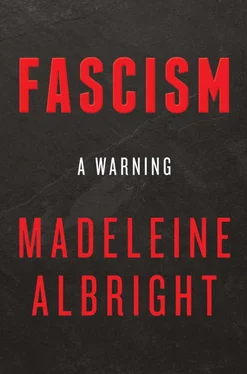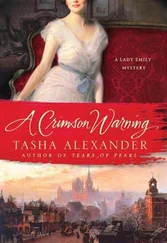1 ...7 8 9 11 12 13 ...66 The chancellor’s average height, dark hair, and unathletic body—so at odds with the Aryan ideal—may have added to his support. He referred to himself as a true representative of the people, a workingman, a veteran, without a bank account, investment income, or a mansion. “Workers,” he declared, “you must look upon me as your guarantor. I was born a son of the people; I have spent all my life struggling for you.”
Citizens of the Reich were fed a steady diet of propaganda at the workplace, in public rallies, and over the rapidly evolving medium of radio. The Führer was the first dictator with the ability to reach eighty million people in a single instant with a unifying summons. Radio was the Internet of the 1930s, but, being a one-way means of communication, it was easier to control. Never had such an efficient tool for manipulating the human mind been available. For a time, Hitler’s major speeches were global events. In schools, meanwhile, Mein Kampf was a sacred text. “We studied it as a Bible. Hatred was our creed,” recalled one student.
Pundits talk today about the importance of authenticity in politics. Hitler lied shamelessly about himself and about his enemies. He convinced millions of men and women that he cared for them deeply when, in fact, he would have willingly sacrificed them all. His murderous ambition, avowed racism, and utter immorality were given the thinnest mask, and yet millions of Germans were drawn to Hitler precisely because he seemed authentic. They screamed, “ Sieg Heil ” with happiness in their hearts, because they thought they were creating a better world.
They were not the only ones deceived. Writing in 1935, Winston Churchill observed:
Those who have met Herr Hitler face to face in public business or on social terms have found a highly competent, cool, well-informed functionary with an agreeable manner, a disarming smile, and few have been unaffected by a subtle personal magnetism. Nor is this impression merely the dazzle of power. He exerted it on his companions at every stage in his struggle, even when his fortunes were in the lowest depths. One may dislike Hitler’s system and yet admire his patriotic achievement. If our country were defeated I should hope we should find a champion as indomitable to restore our courage and lead us back to our place among the Nations.
Hitler was smart enough not to try to reinvent the economy. In his first two years, the gloom of the Depression started to lift and unemployment was cut in half. The boom created three million new jobs, with the armaments industry leading the way. The timing was critical, because Germany’s military might had shriveled. The country had virtually no air force or navy, and its army lacked modern equipment. What it did have was a leader who fully grasped the need to prepare for war because he was bent on initiating just such a conflict. While the British and the French were hesitant to spend money in anticipation of a clash they hoped to avoid, Germany plunged into a massive campaign of semi-clandestine rearmament. For years Hitler insisted that his intentions were peaceful and that he was just trying to compensate for the unfair treatment Germany had received. When he took a step forward, such as in remilitarizing the Rhineland in 1936, he insisted that he planned to go no further, that this limited action satisfied Germany’s demand for justice. But there was always a next step.
Hitler was not going to stop. He urged his followers to awaken so that they might “grow the German Reich of which great poets have dreamed.” He had read enough philosophy to appreciate the concept of world historical figures, agents of destiny, supermen, who could transform an entire age through the majestic power of their will. He knew to the root of his being that he was such a figure, and, in all Europe, he saw but one other.
Four
“Close Your Hearts to Pity”
IN 1940, CHARLIE CHAPLIN RELEASED THE GREAT DICTATOR , HIS first talking movie. In the film, the incomparable actor performed the dual roles of a Jewish barber and the self-aggrandizing Adenoid Hynkel, tyrant of a fictional country in the center of Europe. Born just four days apart, Chaplin and Hitler were two of the world’s most famous men, similar also in height, build, and mustache. [4] Chaplin, whose mustache was fake, financed The Great Dictator personally because U.S. studios did not want to appear political. British authorities intended to ban the movie for fear of offending Hitler, but the war had started by the time the film was complete.
During the movie, Benzino Napaloni, a neighboring dictator, comes to visit Hynkel and the two exchange views on their plans for war. The clownish duo sit in a barbershop, side by side, each feverishly adjusting the height of his chair so that he might look down on the other.
Hitler and Mussolini met more than a dozen times. Each had a lofty vision of his personal destiny and each harbored an unquenchable rage toward a world that, when he was young, had failed to recognize his talents. Both resented their more educated and socially correct contemporaries and both were Fascists, though only Hitler was a Nazi. During his political ascent, Hitler considered the older man to be a trailblazer worthy of emulation. Il Duce paid little heed to Hitler at first, then, when he came to know him, thought him a potentially useful maniac.
Mussolini rejected Hitler’s racial theories, which he privately called “stupid, barbarous, and unworthy of a European nation.” As an Italian, he had no cause to rhapsodize about the myth of a master Nordic race. He had also, early in his career, been recognized by Jewish newspaper publishers as one of the world’s leading Christian defenders of their people.
Memories of the twentieth century would be far different had Italy chosen to align itself with France and Great Britain in the Second World War, as it had in the First. Sadly, Mussolini had resentments left over from the earlier alliance and felt that British and French officials looked down on him as one might on an uncouth third cousin. The decisive break came in 1935 when the League of Nations slapped economic sanctions on Italy for invading Ethiopia. Mussolini deemed it hypocritical for Europe’s leading imperial powers to punish his homeland for wanting an empire of its own.
Mussolini caught Hitler’s fancy because they both favored the same machismo-laden rhetoric of daring, nationalism, anti-Communism, and war. In Mein Kampf , the German lauded “the great man south of the Alps, who, full of ardent love for his people, made no pacts with the enemies of Italy.” Many of the tactics Hitler employed to seize and consolidate power, Mussolini had adopted previously: the reliance on violent gangs, the intimidation of parliament, the strengthening and subsequent abuse of authority, the subjugation of the civil service, the affinity for spectacle, and the insistence that the leader, whether Der Führer or Il Duce, could do no wrong.
Hitler and Mussolini had moments of genuine collegiality, and the former’s appreciation for the Italian dictator’s early triumphs never waned. But Chaplin’s comic satire had a real-life mirror. The two leaders and the countries they represented were an imperfect fit. A diplomatic troll might have scripted the chancellor’s first Italian visit, to Venice in June 1934. Problems began at the airport, where Hitler exited his plane wearing a drab khaki raincoat, only to be welcomed by Mussolini in full military dress. At their meeting, Mussolini tried to get by without an interpreter and so failed to understand much of what Hitler said. The next morning, Mussolini showed up for a parade thirty minutes late, then made a speech in Piazza San Marco that barely acknowledged Hitler’s presence. At lunch, a mischievous chef added salt to the Führer’s coffee. The German leader chose an afternoon boat tour to discuss the racial inferiority of Mediterranean peoples. Halfway through that evening’s reception, Mussolini walked out, and later, in a calculated leak to reporters, he compared his guest to Genghis Khan. Hitler thought of Victor, the Italian monarch, as “King Nutcracker.”
Читать дальше
Конец ознакомительного отрывка
Купить книгу












